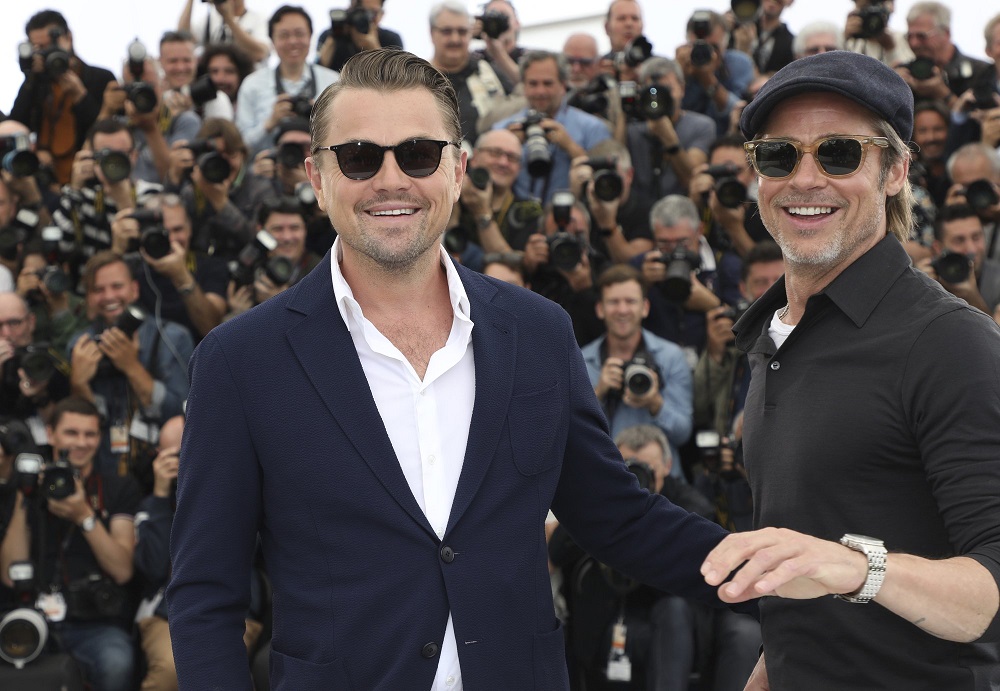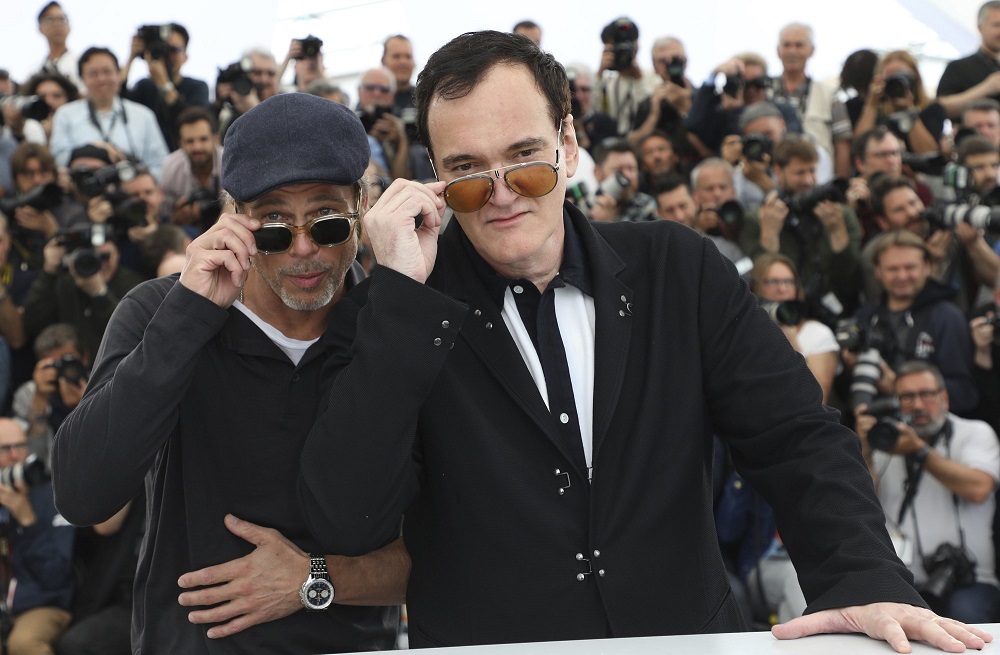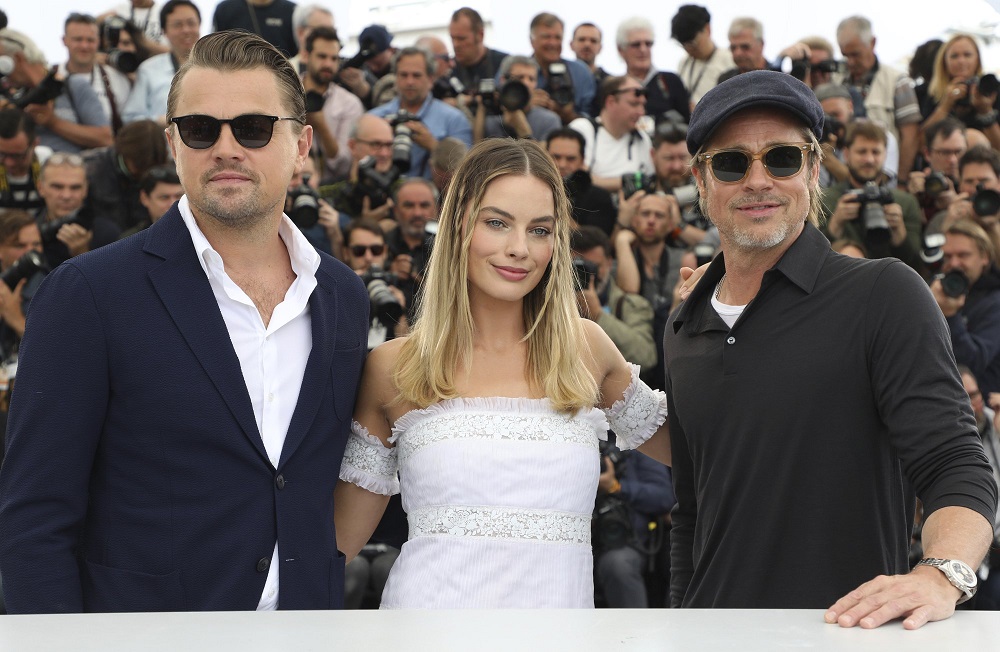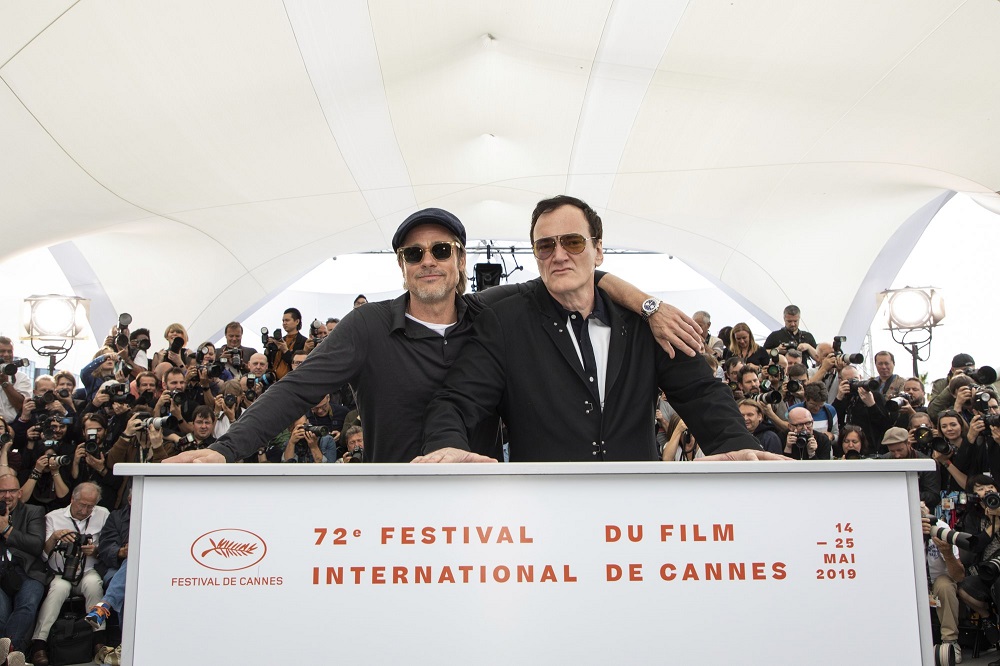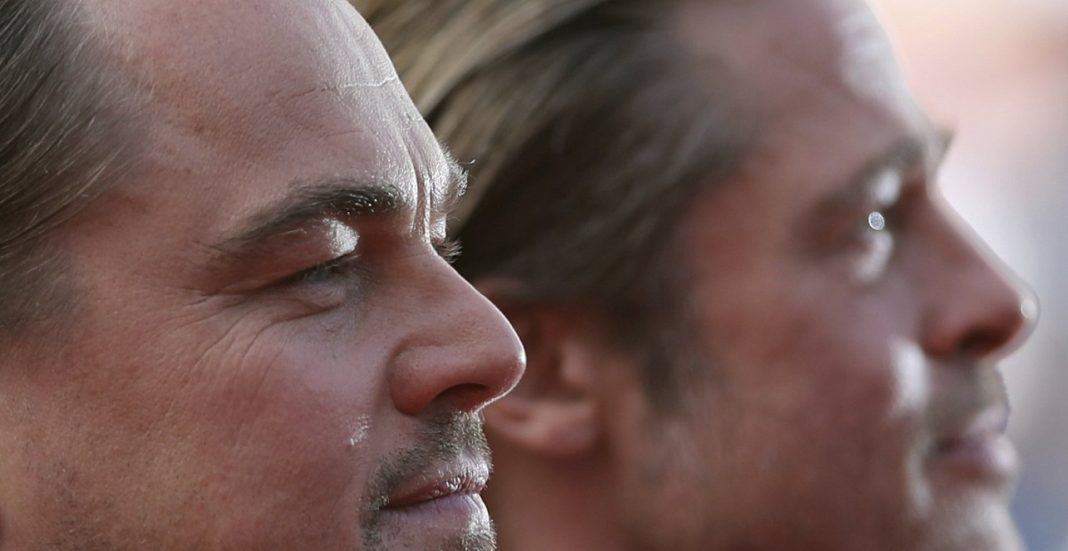
Tuesday saw Quentin Tarantino return to Cannes with quite a bang followed quickly by adoration after the screening of his latest film “Once Upon a Time a Time … in Hollywood.” This is easily one of his best films in years. Yes, I wasn’t so big on “The Hateful Eight,” but prolific filmmakers are forgiven a mistake or two. This time he has Brad Pitt and Leonardo DiCaprio on board with Margot Robbie.
His latest has a dreamlike feel as it follows a handful of Hollywood types living in smoggy, starry Los Angeles in 1969, the year the Manson family went on a frenzied murder spree. Among the victims was the actress Sharon Tate, then married to Roman Polanski. In Tarantino’s Hollywoodland, Tate and Polanski live next door to Rick Dalton (Leonardo DiCaprio), a struggling, self-doubting TV actor. His best friend is Cliff Booth (Brad Pitt), a stuntman whose glory days are probably behind him. Rick could be another Clint Eastwood; Cliff should have been another Steve McQueen.
Brad Pitt and Leonardo DiCaprio said they forged a “cinematic bond” making Quentin Tarantino’s “Once Upon a Time a Time … in Hollywood,” while Tarantino bristled at the suggestion at the Cannes Film Festival on Wednesday that Margot Robbie’s Sharon Tate isn’t primary enough in the film. Someone will always wind up complaining no matter how great the film is. Tarantino did bristle at this, but he’s learned his lesson about clapping back.
“Once Upon a Time … in Hollywood” made its splashy premiere Tuesday evening at Cannes, 25 years after Tarantino’s “Pulp Fiction” debuted at the French Riviera festival, where it went on to win the Palme d’Or. Tarantino’s latest is about an actor (DiCaprio) in TV Westerns and his stunt double (Pitt) in 1960s Los Angeles, set against the backdrop of the Manson family murders.
It’s the first time DiCaprio and Pitt have made a feature together, though the two co-starred in a 2015 short directed by Martin Scorsese. They both suggested it might not be the last.
“There was an incredible ease and comfort getting to work alongside Brad. We kind of grew up in the same generation, got our start around the same time,” said DiCaprio. “We together forged, hopefully, a great cinematic bond in a film about our industry together.”
Pitt concurred. “It’s that thing of knowing you’ve got the best-of-the-best on the opposite side of the table holding up the scene with you,” he said. “I hope we get to do it again.”
The anticipation and glamour of “Once Upon a Time … in Hollywood” brought a frenzy unlike anything else has to this year’s Cannes. Festival artistic director Thierry Fremaux had desperately sought its inclusion. The film was a late addition after Tarantino was able to finish post-production work in time.
The stakes have been high for Sony Pictures, which gave Tarantino a $95 million budget to make what DiCaprio called “his love letter to the industry.” On Wednesday, Sony Pictures chief Tom Rothman sat front row as Tarantino and his cast spoke to reporters.
Tarantino was made a free agent in Hollywood after the downfall of his regular producer, Harvey Weinstein. The director has previously acknowledged knowing about some of the accusations against Weinstein for years, saying: “I knew enough to do more than I did.”
Tarantino made no mention on Wednesday of Weinstein or the controversy last year involving Uma Thurman. The actress said an unsafe stunt on “Kill Bill” left her neck and knees permanently damaged. Tarantino later apologized, calling the incident “the biggest regret of my life.”
He was, though, asked about his feelings toward director Roman Polanski, who was Tate’s husband at the time of the Manson family murders. Played by Rafal Zawierucha, Polanski is seen only sparingly in “Once Upon a Time … in Hollywood.” Tarantino previously defended Polanski for having sexing with a 13-year-old girl, telling Howard Stern in 2003 that she “wanted to have it.”
On Wednesday, Tarantino said only that he’s a deep admirer of Polanski’s “Rosemary’s Baby.” He said he didn’t consult Polanski on the new film.
The tensest moment for Tarantino came when a New York Times reporter asked why an actress as talented as Robbie had relatively few lines in the film. Robbie’s Tate is largely a side narrative in the movie, which focuses on her fictional neighbors (DiCaprio and Pitt).
“I just reject your hypotheses,” Tarantino retorted curtly. Robbie gave a fuller defense, calling her Tate “a ray of light.” She said Tarantino referred to her character as “the heartbeat of the story.”
“The moments that I got gave the opportunity to honor Sharon,” she said. “I did feel like I got a lot of time to explore the character even without dialogue, specifically.”
When another reporter asked Tarantino if he ever had any hesitation about turning a real-life tragedy into a movie, he replied, simply: “Um, no.”
“Once Upon a Time … in Hollywood,” which opens in U.S. theaters on July 26, has been met with largely good reviews in Cannes, with critics calling it a nostalgic ode to a bygone Hollywood.
Asked if he would have rather made movies in 1969 than now, Tarantino said: “I prefer any time before cell phones.”
To prepare for your roles, did Tarantino show you movies or give you a watch list?
BRAD PITT [to DiCaprio] More you than me.
LEONARDO DICAPRIO We had a screening of a multitude of B films that I had never heard of, a lot of 1960s television with actors like Ralph Meeker and Ty Hardin. These guys could have been McQueen-esque, but didn’t make the transition from black and white television, especially westerns, to career-makers like “The Great Escape.” So it was almost like a love story to them. Did they get that one opportunity? No, that may have passed them by. So let’s start talking about your character, what he might have been, what he’s struggling with as a working-class guy in the industry who has been playing the heavy from television show to television show. What that does to his psyche and his confidence?
PITT I [remember] a lot of that television. In fact [Tarantino] reminded me of much of it that I had forgotten. We did watch “Billy Jack,” some Tom Laughlin, just for fun. We were pretty much weaned on the same television and film. We talked a lot about the stuntman-actor relationship. I got to meet Bud Ekens, who was Steve McQueen’s. This was a legendary relationship. He did the jump for “The Great Escape,” got Steve McQueen into motorcycles. And, then, Burt Reynolds and Hal Needham. We got to talk to Burt. Originally he was going to play George Spahn. We had rehearsals before he passed. I was surprised what a joy that was and how giving he was, and I was really moved by it. But then I realized that so much of my childhood was watching Burt Reynolds — he was the biggest thing around in the late 1970s.
Did you spend more time together so you could develop your flow?
DICAPRIO You come to Hollywood and you’re basically isolated and left to your own devices. [Rick and Cliff] rely on this friendship for everything. We immediately fell into those shoes. We understood that relationship [laughs] so quickly that on the first day, we were those guys.
PITT It was pretty automatic. We both came on the scene around the same time, we have crossed paths many times, we have the same reference points. I’ve always felt that you don’t understand the deal you’re making when suddenly you’re that lone gazelle on the plain and the herd’s gone, so to speak. And, you know, my friend here [he gestures toward DiCaprio] has been the same. So there’s automatic comfort in having experienced the same thing in that way. That’s not a complaint in any way, I say that merely as fact. We have mutual respect and I know when an actor elevates a scene, so we carry that respect.
The way Tarantino’s movies are written, his voice is very strong. Did it take some time to replace his voice with yours?
DICAPRIO And hear your own, is that what you’re saying? [Laughs] I suppose so. He is such an absolute powerhouse of a personality, of course, and an artist as well. But, look, he gives you real ownership. [There are] beats that you need to hit. But there are plenty of opportunities where once you get into the groove, there can be a completely improvisational scene. And you’re almost making reference points from his dialogue and his voice and the multitude of talks that you’ve had with him about who this character is and what kind of movie he wants to make. They sort of bloom sometimes, and that’s happened quite a few times.
PITT You know when you have an altercation in public or you put your foot in your mouth, and you’re driving home and you think of that witty thing that you wished you would have said? His dialogue is that witty thing.
Rick Dalton is kind of like the Clint Eastwood who doesn’t happen.
DICAPRIO He is the guy who almost got that shot — and that’s what’s torturing my character. I grew up in this industry, I have a lot of friends who are actors, and there’s so much talent out there. But it really boils down to being at the right place at the right time.
PITT We talk about this with streaming. With streaming, we see so much talent that was always there. There are so many more opportunities. We’re seeing this wealth of actors, writers and directors. And it just reminds us how lucky we were to land where we landed.
DICAPRIO Mm-hmm.
Did it worry you that so much seems disposable.
PITT It may be. I’ve been really interested in younger generations that cannot just sit in a chair for the length of a movie. They want their information quicker. That may just be the changing of the times. I don’t know.
DICAPRIO I see positives in the fact that things and ideas and story lines that normally studios might not take a chance on, through these new streaming services, will see the light of day. So cream may rise to the top. What were people saying about the transition from silent films to talkies and the advent of television? There were all these changes, but great art is going to be spoken about and, hopefully, we don’t get so inundated that we become confused.
I actually found “Once Upon a Time” rather moving. That was a surprise to me with a Tarantino movie.
PITT Absolutely, you can see it in the script, you can feel it.
DICAPRIO The only thing I’ll say is that I know what the Manson murders sort of represented, being a native of Los Angeles and having parents who are still hippies to this day.
Like real hippies?
PITT I met his dad on set and said, “How nice, he’s going to be an extra in the film.” And he goes “No, that’s him every day.”
DICAPRIO They talked about this loss of innocence, this real turning point where they had these ideals about what the future could be. And then all of a sudden this one longhaired guy — and how he manipulated these kids to do what they did — it changed the world forever.
PITT I walk away [from the film] with a hopeful reminder of what it can be, what we can be.
What was the hopeful part?
PITT Taking care of each other, that’s what I feel at the end. It really endears me to Quentin. I could be projecting, but I see a kid who was home by himself a lot and found his —
DICAPRIO — solace —
PITT — solace and direction in these heroes on the screen, big and small. I find that in his dialogue. I find that in the scenarios. I find this one really endearing. He’s exposing his own self-doubts. [DiCaprio starts mm-hmming.] I just see this real innocent kid who wishes life could be this way. Maybe it’s because I know Quentin I find it hopeful and endearing. I was really, really moved at the end.
It’s interesting that he’s gone back to the past again.
PITT He’s going back to his childhood.
DICAPRIO Yeah, I agree. What Brad said is very pertinent because cinema and television and all this stuff, it’s in [Tarantino’s] DNA. He puts things in historical context but he also creates a fairy tale. This whole idea of him recreating history — like what he did in “Inglourious Basterds” with Hitler — much like Scorsese, too, where in their childhood, cinema became part of their DNA and their language and their ability to converse with others —
PITT — their spiritual grounding —
DICAPRIO — yeah, it’s embedded in who they are as human beings. You rarely find people like that. Like Brad was saying, this is his homage and his reminiscence of 1969 where everything changed culturally and cinematically. It’s incredibly imaginative.


